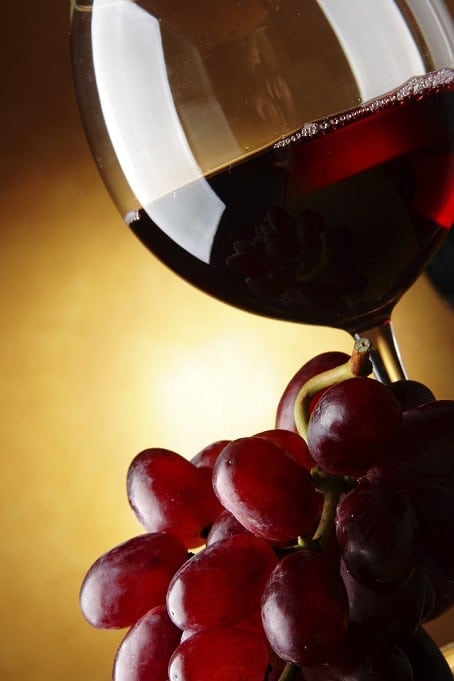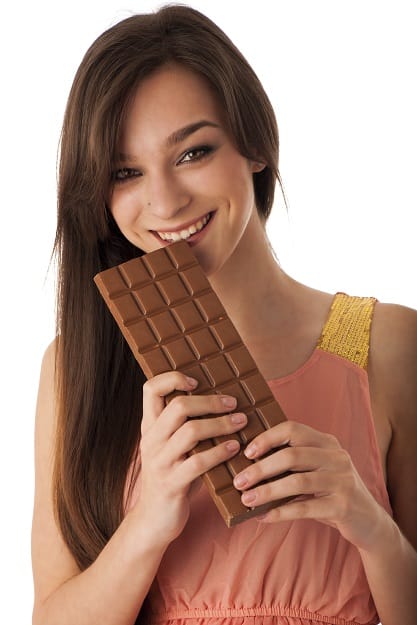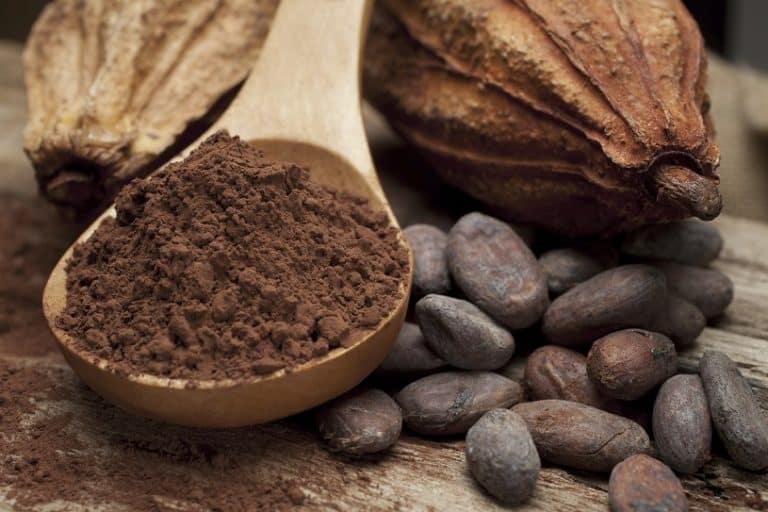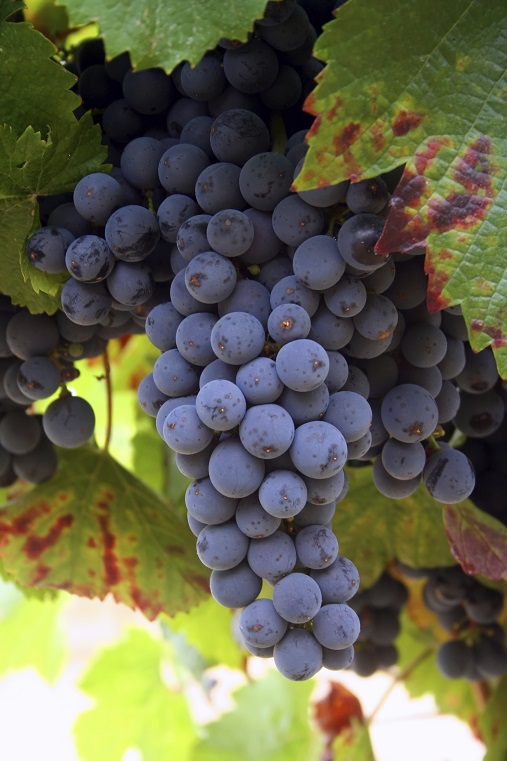 Resveratrol is a natural phytoalexin found in foods. Red wine is famous for its resveratrol content, but you can also find it in peanuts, red grapes, mulberries and dark chocolate.
Resveratrol is a natural phytoalexin found in foods. Red wine is famous for its resveratrol content, but you can also find it in peanuts, red grapes, mulberries and dark chocolate.
A phytoalexin is merely a specific class of antioxidants, one that has specific medicinal properties…
…and it’s because of these properties that resveratrol has attracted a ton of attention recently. It’s pointed out that the world’s oldest living woman ever, Jeanne Calment, ate lots of dark chocolate and red wine every day.
Hence, resveratrol is marketed as a miracle by supplement companies for extending your lifespan. Importantly for us, resveratrol has many other medicinal powers that can potentially improve your acne.
Firstly, there’s a very interesting story behind resveratrol:
- Resveratrol was discovered way back in the 1930s, by a Japanese scientist called Michio Takaoka. But in this time specific antioxidants and other plant compounds were being discovered daily; nobody thought anything of it. Decades later, scientists were trying to unravel an old conundrum, the conundrum of why countries that drank red wine seemed so healthy. The French drank tons of it and they had very low cancer and heart disease rates. Scientists already knew that wine contained antioxidants, but so did other foods. Why was red wine particularly powerful? Then finally, they performed some tests on resveratrol, and were astounded. Resveratrol had the ability to protect from heart disease, slash inflammation levels, and its anti-oxidant activity was particularly potent. Scientists had finally found the answer.
If resveratrol is the reason behind the French being so healthy, and they remain relatively healthy to this day, then it is a pretty powerful substance indeed.
The best part for us is that many of the mechanisms through which resveratrol exerts these effects, like increasing antioxidant production, are terrific for acne.
Resveratrol helps your acne when you ingest it, but it seems to be a particularly effective topical acne treatment:
- In this study scientists applied both benzoyl peroxide and resveratrol to the skin of acne patients. They found that resveratrol significantly inhibited the growth of p. acnes bacteria, by weakening the bacteria’s outer membrane structure. They also found that combining resveratrol with benzoyl peroxide (a common store-bought acne treatment) massively enhanced the latter’s ability to destroy p.acnes bacteria.
- Scientists in this study applied a gel containing resveratrol to an acne patient’s face. They applied resveratrol to the right side of the face and a placebo gel to the other. After 60 days, the scientists observed that the pimple/acne count on the resveratrol side of the patients’ faces fell by a massive 54%. The acne on the left side was reduced by only a pitiful 6%.
The second study backs up the first one nicely. Resveratrol does not have the ability to kill p.acnes bacteria but it prevents it from growing.
Because p. acnes bacteria will eventually die without any outside assistance, the improvement in acne is likely due to the prevention of new bacteria from being born and taking its place.
Read Annihilate Your Acne – get the greatest diet ever for clear and radiant skin
One could argue that the 54% reduction was natural variation in the acne, but when you consider that the other patients enjoyed only a 6% reduction, it’s clear that resveratrol was responsible. Resveratrol is a powerful force for acne when applied topically.
More reasons why resveratrol is excellent
There’s pills everywhere that are touted as being miracles for acne but resveratrol actually gets closer than most. Resveratrol is actually backed up by scientific studies and you have the real world evidence to consider.
There’s the case of the French, and the wine-loving Spanish and Italians are pretty healthy too. Red wine itself is linked to many health benefits; this one found that drinking more red wine every day for four weeks led to an increase in HDL, the healthy type of cholesterol. Red wine has long been associated with improved cardiovascular health.
These health benefits show that eating resveratrol is great for your health too. Oral resveratrol is the focus of extending your lifespan and of many other benefits. For acne there are several important benefits:
Resveratrol decreases inflammation
 Improved heart health is the classic benefit of resveratrol but a lot of these benefits actually come from lowered inflammation. Tackling chronic inflammation is one of the two best strategies for your acne and skin, because an excessive inflammatory response is what creates acne in the first place.
Improved heart health is the classic benefit of resveratrol but a lot of these benefits actually come from lowered inflammation. Tackling chronic inflammation is one of the two best strategies for your acne and skin, because an excessive inflammatory response is what creates acne in the first place.
- In this 2011 study a team of scientists gathered 50 healthy adult smokers. 25 were fed a placebo, and the other 25 were fed a resveratrol supplement, and after 30 days followed by a 30 day washout period, they swapped the groups around to assess the differences in treatments. They discovered that in the resveratrol group, levels of C-reactive protein were far lower. C-reactive protein is a classic measure of inflammation; it’s produced as a by-product of inflammatory cytokines. Hence, lower C – reactive protein means that inflammation has fallen too.
The likely explanation is that resveratrol reduces inflammation by inhibiting 5-lipoxygenase. That is an enzyme that helps to manufacture your body’s pro-inflammatory chemicals, including interleukin-6 and other cytokines behind acne.
Resveratrol has been shown to reduce 5-lipoxygenase, and therefore rather than cooling any existing inflammation, resveratrol can actually prevent it from occurring in the first place. This study also found that resveratrol significantly inhibited a variety of inflammatory cytokines.
Next: the 6 vitamins and minerals which can massively reduce acne
Resveratrol might also inhibit NF-kappaB, a master molecule that triggers the release of nearly all acne-creating inflammatory chemicals in your body. Inhibiting NF-kappaB is one reason why selenium is such a terrific acne supplement.
Then there’s a power which scientists are still furiously investigating but is nevertheless very promising. According to some studies, resveratrol consumption may increase the amount of beneficial bacterial strains in your gut. Additionally, one study found that resveratrol could kill off the pathogenic bacterial strain called clostridium. Clostridium is known to lead to diseases behind acne like leaky gut syndrome. Unhealthy gut bacteria overgrowth is a huge cause of acne, a cause that few people know about.
Moreover, resveratrol has many other effects on health that suggest strong anti-inflammatory powers.
Resveratrol has been shown to protect neurons from inflammatory damage, and lessen the confusion and memory loss of Alzheimer’s patients. Resveratrol is being investigated as a potential treatment for rheumatoid arthritis and other joint pains. Studies suggest that resveratrol can strengthen muscles and restore muscles which are wasting away – and such wasting often occurs due to bombardment by out of control inflammation.
Resveratrol reduces oxidative stress
 Resveratrol is an extremely potent antioxidant, meaning it will hunt down and destroy free radicals in your body, and also protect your sebum from oxidising and becoming more potent at blocking pores.
Resveratrol is an extremely potent antioxidant, meaning it will hunt down and destroy free radicals in your body, and also protect your sebum from oxidising and becoming more potent at blocking pores.
- This study added resveratrol to pig’s blood, and found that it was very good at preventing the formation of free radicals.
- In this study scientists tested the effects of resveratrol on rat livers. They noted a big reduction in peroxidation, a key effect of free radicals. Peroxidation is actually the key process that causes acne; your squalene in your sebum “peroxidises” to become squalene peroxide, and this is the substance that really gets your pores blocked. Therefore by preventing this process, resveratrol might be particularly suitable for acne patients. This could also explain why resveratrol works so well when applied topically.
What’s also interesting is that resveratrol not only functions as an acne antioxidant itself, but it also increases the activity of other acne antioxidants. Your body actually manufactures some of its own antioxidants, and one of the main ones is called superoxide dismutase.
That’s an antioxidant which is particularly potent at tracking down and destroying free radicals. It’s so effective that supplement company scientists have been working furiously to produce a supplement form.
For years their efforts failed miserably, but recently they have discovered that once inside the body, resveratrol can enhance superoxide dismutase’s activity. It does so via an increase in oxygenase-1, the enzyme which is responsible for superoxide dismutase’s production. Therefore, resveratrol can provide a two pronged assault on oxidative stress and acne both by being an antioxidant itself, and by allowing others to do their job more effectively.
Final judgement – is resveratrol worth using?
Resveratrol is definitely not a scam and it may be highly effective for treating acne.
Many opponents of resveratrol claim that it doesn’t show up in the bloodstream and is thus useless. However, that’s irrelevant because the scientific studies have shown that resveratrol is extremely healthy.
What happens is that resveratrol is metabolised by your gut bacteria into smaller anti-inflammatory compounds – that’s why resveratrol itself doesn’t show up.
The evidence that resveratrol tackles inflammation, oxidative stress, heart disease, and acne is extremely strong.
With that said, it is not vital that you use it. Many of resveratrol’s benefits can easily be found elsewhere; for example, raw honey is just as effective for topical application as a resveratrol gel. Its antibacterial powers are just as strong. Likewise, bananas and apples have many unique acne antioxidants of their own that are nearly as powerful as resveratrol…
…but if you are committed to pushing your acne clearing efforts to the limit, then resveratrol is great for an extra boost, or you can take it to be extra safe.
It depends on your circumstances. Heavy users of make up and antiperspirants, for example, are under a lot more oxidative stress because additives like phthalates and aluminum are huge sources of free radicals. If that’s the case then the additional antioxidant powers of resveratrol will have much bigger benefits for acne, whether obtained from a supplement or the foods rich in it.
It’s also useful to have as a backup in case another acne product doesn’t work. Honey is generally great for your skin but it’s always possible that you’ll have an allergic reaction to it; if that’s the case then you’ve got resveratrol as an alternative.
The 7 greatest topical treatments for naturally clear skin
Whether you take resveratrol is up to you. Just remember that it’s an excellent product that has been shown repeatedly to both improve acne and deal with the bodily factors that lead to it, whether orally or topically.
How to apply resveratrol to your acne
 The acne and cosmetics industry has pounced on resveratrol like a lion pounces on a gazelle. As a result resveratrol creams are popping up everywhere, and you might think that’s a good thing; after all resveratrol is proven and isn’t a scam…
The acne and cosmetics industry has pounced on resveratrol like a lion pounces on a gazelle. As a result resveratrol creams are popping up everywhere, and you might think that’s a good thing; after all resveratrol is proven and isn’t a scam…
…but it’s far cheaper and just as effective for acne to use red grapes instead. Red grapes are second only to red wine (highly concentrated red grapes) as the best food source of resveratrol; just buy some red grapes from the grocery store, press them against your acne so that the juice flows, and allow the resveratrol to be absorbed by your skin. The studies above show that resveratrol is absorbed into the skin well, from whatever source.
You also miss out on any additives from normal creams that could give your skin fresh acne. In fact, if you’re unaware, then manmade ingredients in cosmetics can be a huge cause of acne, not just because they’re topically applied, but because they get absorbed into the bloodstream too. In my eBook Annihilate Your Acne there’s a 10 page chapter on how to avoid those chemicals.
Red grapes are a less concentrated source of resveratrol than the creams, but because they are only a fraction of the price you get far better value for money. You will also feed your skin many acne nutrients other than resveratrol. Resveratrol cream contains highly concentrated resveratrol, whereas grapes contain good amounts of it plus plenty of vitamin C and other acne antioxidants. Your skin will absorb those acne compounds like a sponge.
How to use red grapes – red grape juice is a liquid and is rather runny. It won’t stick to your face like a blob of honey does. Therefore it is best to lie down for a while when you apply it. Eventually it will dry and you can go about your day as normal. The only other problem is that you’ll look like you have blood on your face but as usual, the simple solution is to apply it before you go to bed.
How to take resveratrol orally
 Compared to topical products, oral resveratrol supplements are far more useful for acne.
Compared to topical products, oral resveratrol supplements are far more useful for acne.
You can get plenty of good pill ones for reasonably low prices and the concentrations of resveratrol are very high. Additionally, resveratrol supplements tend to be very low in additives compared to normal vitamins.
Therefore, taking a resveratrol supplement is a good idea if you have the money. If you’re poor then eating red grapes will give you plenty, or even cheap red wine.
It doesn’t have to be sourced from the finest grapes in the vineyards of France; as long as it has a strong flavour, and is free from weird additives, then the wine will contain plenty of resveratrol. If you love to drink alcohol (full guide to alcohol and acne here) then consider replacing beer with red wine.
Dark chocolate is another terrific source, as are peanuts and Japanese knotweed. Supplements might have a higher concentration, but food is still effective for acne; after all, the famous health benefits came from red wine and not a supplement.
If you do want to take a supplement, I recommend this aSquared Nutrition Resveratrol. It’s free from any toxic chemicals and additives, with the vegetable capsule as the only additive. Importantly, this supplement is standardised to consist of 50% trans-resveratrol, the best proportion of the most efficiently absorbed form.
Conclusion
Resveratrol is a massively hyped product and for once it lives up to that hype. Resveratrol is great at preventing acne both when applied topically and consumed orally.
If you are suffering from chronic inflammation, then resveratrol is particularly powerful for acne. Symptoms of inflammation are joint pains, muscle weakness, and injuries becoming far more inflamed than usual. It’s useful if you need antioxidants for acne too; for example, if you’re a smoker, if you don’t eat many fruits and vegetables, and if you’re exposed to a lot of free radical inducing air pollution.
Clearly you shouldn’t rely on resveratrol alone – changing your diet is critical. You’ll never cure acne without eating antioxidant rich foods more generally, or without eliminating sugar and vegetable oils. Nevertheless, resveratrol is a great weapon for your arsenal.
Bonus – does resveratrol extend lifespan?
Consider this fact – the oldest woman and indeed human ever to have lived was not Japanese, as one might expect, but French. Her name was Jeanne Calment and she credited her longevity to drinking plenty of Port wine – which is red and consequently packed with resveratrol. Was she talking nonsense? Apparently not – one study found that resveratrol has a powerful preservative effect on cells. When resveratrol was applied to yeast cells, their longevity was extended by a huge 73%. Results have been similar for many other cells, including those from animal tissue.
Then there’s this study which performed experiments on mice where they were fed red wine. According to the scientists, the wine enhanced the activity of an anti-aging gene called SIRT1. More energy was delivered to the cells and hence the mice lived for longer. The researchers concluded that resveratrol has promising effects on animal lifespan.
Also consider that France has the thirteenth highest life expectancy in the world, and Italy, another red wine nation, is even higher. So drink red wine, eat red grapes and eat a small amount of dark chocolate every day, and you never know – you might live to a hundred or more.
NEXT: the ultimate diet for clearing acne permanently
Thanks for reading!